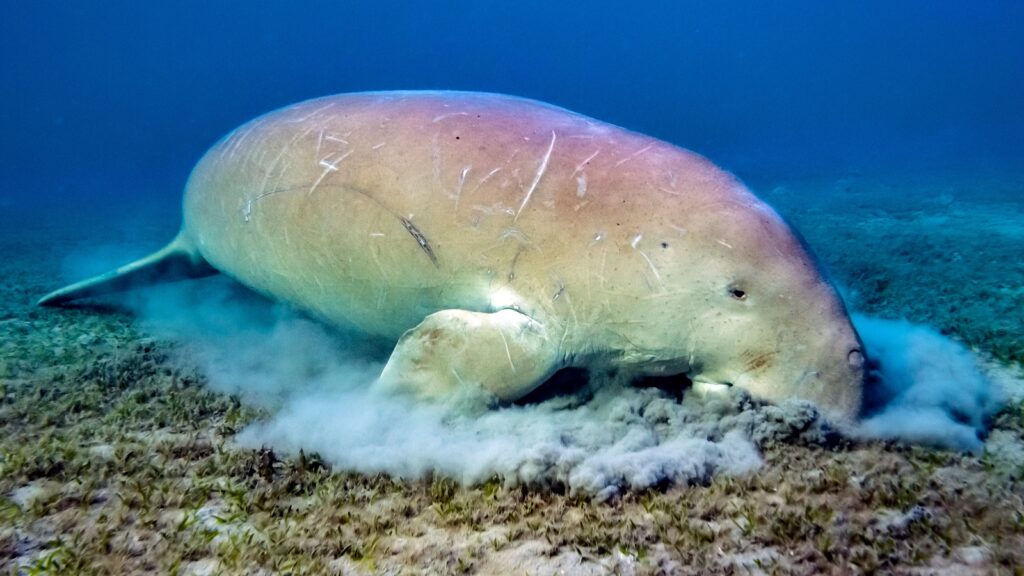The dugong, a marine mammal related to the manatee, is now officially considered functionally extinct in China.
The dugong still exists in other regions of the world but is at risk of total extinction. Confined to shallow waters of the Indian and Pacific Oceans, they are most commonly seen off the East African and Australian coasts. It is estimated that around 30,000 remain worldwide.
Gentle-natured and slow-moving, the animal’s relaxed disposition has been linked to their eventual demise in China. Owing to their ease of capture, the animals have been hunted for meat and medicinal oil for many years. The latter was commonly used to treat sore throats, chest infections, and dry skin conditions.
The dugong was classed as a grade-one national key protected animal by the Chinese State Council in 1988. However, researchers claim that continued habitat loss contributed to dwindling numbers.
Thought to be the inspiration for folktales about mermaids, dugongs are the only fully vegetarian marine mammals. They weigh half a ton on average and are hard to distinguish from manatees, save for their whale-like tails.
Confirming the dugong’s suspected extinction in China
A large survey study was conducted across four Chinese provinces. It was designed to determine both numbers and distribution patterns of remaining dugongs, with a view to confirming their extinction.
Interviews were carried out with various fishing professionals to determine how many sightings there have been in recent years. In order to compare population numbers, researchers were trained to identify the animals and given access to all historical dugong records.
The study concluded following 788 interviews with local fishing people. Only 12 percent of participants recognized a picture of a dugong, with just five percent reporting sightings. In the last five years, only three people claimed to have seen one of the marine mammals.
Delving further into the sightings data, it was revealed that no verified dugong observations have been made since 2000. The average amount of time since local residents remembered casually seeing them was 23 years.
The findings have resulted in the research team officially declaring the dugong as functionally extinct in China, meaning that they cannot sustain themselves or their population.
Professor Samuel Turvey, a co-author of the study, told Plant Based News: “The tragic extinction of dugongs from China highlights the fact that threatened ‘flagship’ large mammals continue to be lost from the world’s ecosystems, despite the existence of a global network of conservation policy organizations – and that proactive and effective management changes need to be made to prevent further losses.”
“This is a wake-up call that extinctions are happening right now and that we need to respond urgently. Dugongs are also ‘the canary in the coalmine’ – their loss demonstrates how China’s wider seagrass ecosystems are now too degraded to support viable populations of large mammals, with crucial implications for their ability to underpin marine food webs and maintain regional fisheries.”
Evidence of wider biodiversity loss
Herbivorous dugongs feed on seagrass beds but such habitats are dwindling and in turn, contributing to marine species’ extinction.
The UN Environment Programme states that up to seven percent of seagrass habitats are lost every year. The majority fall victim to pollution from agricultural and industrial sectors, climate change, and unregulated fishing practices.
“One by one we are witnessing a vanishing act of key species across the planet. The functional extinction of the dugong in China serves as the latest wake-up call that industrial fishing, hunting, and habitat loss need our urgent attention and action,” said Seaspiracy director Ali Tabrizi.
Underlining the importance of seagrass ecosystems, the UN program states that the protection of such habitats is essential in the fight against the climate emergency. In a report published in 2020, the UN revealed that despite only covering around 0.1 percent of the ocean floor, seagrass meadows store up to 18 percent of the world’s oceanic carbon.






